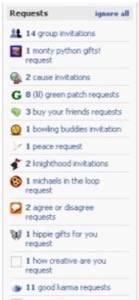What are the number one problems facing today’s social networks? According to the young developer Vladislav Chernyshov they are: privacy issues, distraction and time-wasting, quantity over quality, ads, and lack of control over your identity. That’s why he, Dmitry Gorpinchenko, and Andrew Chernyh, all students at Novosibirsk State Technical University (NSTU) in Russia, have founded Genome, an upcoming next-generation social networking service which addresses the main problem of Web 2.0: the ever-increasing quantity of Web 2.0 resources and the lack of tools to manage them.

What’s Genome?
So, what, exactly is Genome, then? Well, it’s not really just one thing – it’s four:
- Social Network: Genome a social network like any other. You’ll have a user profile, friends, and tools that let you social with them in comfortable, natural ways.
- Contact Manager: You’ll be able to keep track of your contacts’ information on Genome.
- Instant Messenger: Genome will provide an open instant messenger that’s integrated with your contacts.
- Identity & Social Graph Provider: Genome will have an open identity policy so your Genome identity is easily sharable with other sites. That means that other sites and services can query Genome for some pieces of your personal information.
The Genome project has only been in development for three months and most of the details on how it operates, technically speaking, are being kept quiet. However, we got a look at some of their plans as well as some screenshots of the mobile app.
What Genome Is Not
Genome is not an aggregator spock.com profiles or FriendFeed. Genome can function as your central identity, not a collection of your identities out on the web nor a collection of your social web activities.

It’s not a competitor to other data portability movements like Facebook Connect, MySpace’s Data Availability, or Google Friend Connect. Instead, Genome will work cooperate with them to give users control over their own data. To do so, Genome will not use any closed, proprietary protocols – only open standards.
What Genome Will Let You Do
Because it will use open protocols, the goal is to let users carry their identites anywhere on the web. Updates made to those identities out on the web will make their way back to Genome instead of users having to return to Genome to edit their profiles.
You’ll be able to access Genome’s service from a web app, a desktop client (they have a Windows, Mac, and Linux client planned), and a mobile app. A Google Android client has already been built, too. In fact, Genome’s creators are particularly focused on the mobile market and are working on real-time sync and location awareness in this area. Of course, developers will also be able to build their own web apps and clients thanks to Genome’s open standards and API.
We got a sneak peek at the Android app, but be warned, the app is still very much in alpha and may change a lot prior to launch:

To deal with “noise” Genome is implementing something they’re calling a “real-life relationships” model. In your real life, says co-founder Chernyshov, “you can control who knows what about you, and you can control what you know about them.” Those granular relationships will be available on Genome, yet kept as simple as possible.
How You’ll Use Genome (At First)
There aren’t too many details on the specifics of how you will use Genome or the technical details as to how Genome operates, but we do that the first public release will only be the beginning of their effort to solve all the problems noted at the beginning of this post. The first iteration of Genome will be focused on the problem of identity management.

In the area of contact and identity management, the problems that Genome wants to solve specifically include the following: you can’t import or export data on today’s social networks, you can’t control who sees what about you, you can’t watch who knows what about you, and you can’t ask a new web service to retrieve your name, email, contacts, etc. from a social network site. Well, as for that last issue, data portability is supposed to address this, but perhaps Genome’s creators aren’t interested in waiting for the major providers to make it work.
To start off, you’ll be able to import your address book contacts and (possibly) import friends from various social networks. (They aren’t sure if they will have that feature ready for the first public launch or not). However, they do plan on supporting Google Friend Connect and, further down the road, they will offer automatic contacts discovery.
Once you add a contact to Genome, it’s yours – it’s not locked in any way. Unlike a network like Facebook, for example, who locks in your contacts so you have to keep using their walled garden service, the data from Genome can be freely moved about the web. If you add someone to Genome then invite them to join the service, their profile will be automatically linked with the contact you’ve already created. The details don’t need to be re-entered.
Other Issues Being Addressed
As the Genome project progresses, future versions of the service will focus more on privacy concerns, distractions, quality interactions, and advertisements. (More details can be found on this post about Genome.) How these issues will be dealt with is currently under wraps.

Privacy: Privacy levels will be set up to mirror real-life relationships: spouse or significant other, family, best friend, friend, buddy, colleague, business partner, high school acquaintance, contact, etc. Human relationships have detailed nuances – social networks should, too.
Distractions: Social networks today are bogging us down with messages, invitations, pokes, and friend requests. Some of these matter, some of these waste our time, but how can we pay attention to only the really important things? Genome plans to address this.
Quality Issues: The more “friends” you have, the less rich the interactions and the relationships you maintain with your friends on your social networks. Interactions become one-way, more similar to RSS than to real relationships.
Ads: Today’s ads are often irrelevant, usually unwanted, and sometimes even inappropriate. Even targeted ads seem to miss the mark. If Genome truly has a solution for this problem, that will be extremely impressive.
Conclusion
At the moment, Genome sounds almost too good to be true – a social networking service that solves all our problems? Nevertheless, it’s certainly intriguing. If it can really do what it proposes to do, then it’s worth signing up for (sign-up is here).
Genome launches into private beta on October 1st, 2008.
Facebook Requests: Dan Zen

















